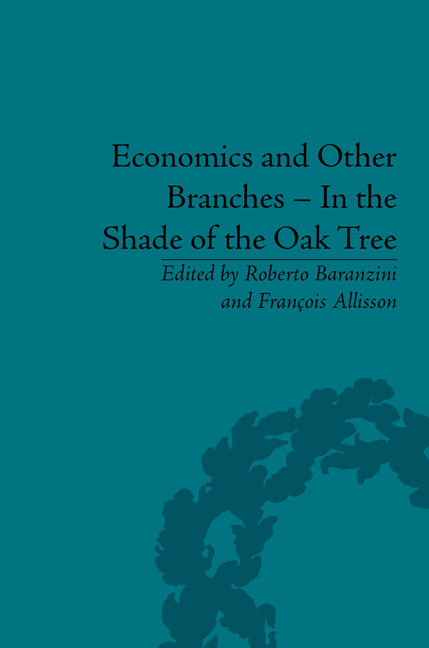Book contents
- Frontmatter
- CONTENTS
- List of Contributors
- List of Figures and Tables
- Introduction
- Pascal Bridel's Bibliography (up to 2013)
- Part I Léon Walras's Economic Thought
- Part II The Spreading of Thought
- Léon Walras's Reception
- The Lausanne School
- French Matters
- Cambridge UK
- Part III Monetary Theory
- 14 Financial Stability: The Role of Central Banks
- 15 The Fisher Relation in the Great Depression and the Great Recession
- 16 Endogenous Money in an Elementary Search Model: Intrinsic Properties versus Bootstrap
- 17 Digression on the Relations between Anthropology and Economics on the Topic of ‘Primitive’ Currencies: A Page in the History of Thought
- Part IV Methodology
- Part V Economics and Humanities
- Economics and Social Sciences
- Some Insights from Visual Arts
- Part VI Economics and Civil Society
- Notes
- Index
16 - Endogenous Money in an Elementary Search Model: Intrinsic Properties versus Bootstrap
from Part III - Monetary Theory
- Frontmatter
- CONTENTS
- List of Contributors
- List of Figures and Tables
- Introduction
- Pascal Bridel's Bibliography (up to 2013)
- Part I Léon Walras's Economic Thought
- Part II The Spreading of Thought
- Léon Walras's Reception
- The Lausanne School
- French Matters
- Cambridge UK
- Part III Monetary Theory
- 14 Financial Stability: The Role of Central Banks
- 15 The Fisher Relation in the Great Depression and the Great Recession
- 16 Endogenous Money in an Elementary Search Model: Intrinsic Properties versus Bootstrap
- 17 Digression on the Relations between Anthropology and Economics on the Topic of ‘Primitive’ Currencies: A Page in the History of Thought
- Part IV Methodology
- Part V Economics and Humanities
- Economics and Social Sciences
- Some Insights from Visual Arts
- Part VI Economics and Civil Society
- Notes
- Index
Summary
In the basic search-theoretic approach to money, as in most sophisticated models which have followed, the quantity of money is given exogenously. That starting point is unsatisfactory and misleading. It is responsible for ascribing the existence of monetary equilibrium to bootstrap effects only. In fact, it turns out that some intrinsic properties of the economy, such as tastes and technology, are very important, and not merely beliefs. Moreover, assuming an exogenous quantity of money contradicts the now widely held opinion that monetary authorities do not have the power to directly determine the quantity of money but only to indirectly control it by manipulating some other variable, namely the rate of interest. Monetary models should account for the important ‘stylized fact’ that money is issued at agents' request under the constraint of rules fixed by a non competitive authority. The purpose of this essay is to propose an elementary version of such a model.
In our model, money is issued according to a very simple principle which is nothing but a generalization of the pure gold standard. In a pure metallic system, mintage consists of coining privately produced gold, making it useless for any purpose other than circulation. The gold producer has thus a choice between exchanging gold in the market or bringing it to the Mint. A condition of indifference between the two alternatives determines which quantity of gold is coined and which enters the market as a commodity.
- Type
- Chapter
- Information
- Economics and Other Branches – In the Shade of the Oak TreeEssays in Honour of Pascal Bridel, pp. 205 - 212Publisher: Pickering & ChattoFirst published in: 2014



